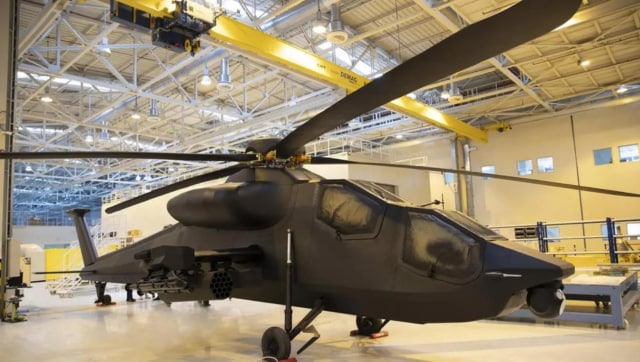Turkey unveils attack helicopter T929, aims to capture global market
The T929 ATAK 2 heavy attack helicopter, a heavier and larger variant of the T129 that it seeks to replace in Turkish service, has been introduced by Turkish Aerospace (TA) and the Turkish Defence Industry Agency, according to a Jane’s report.
The T929 is anticipated to have its maiden flight in the upcoming weeks and will be used by the Turkish Armed Forces and export customers.
According to the Janes report, the T929 has a conventional attack helicopter design, with a stepped tandem cockpit, stub wings, and fixed-tailwheel landing gear.
According to Janes, the T929 cockpit features a big display area and is protected against.50 calibre shots. Air-to-surface and air-to-air missiles, guided and unguided rockets, a chin-mounted T-30H 30-millimeter chain gun, and an Aselsan forward-looking electro-optic/infrared turret can all be carried on its stub wings, which can support 1,200 kilogrammes of ordnance.
Contrary to the US-made twin LHTEC T800s on the T129, Janes claims that the T929 prototype is powered by two Ukrainian Motor Sich TV3-117VMA-SBM1V Series 1 turboshafts.
Due to US sanctions on Turkey as a result of Turkey’s acquisition of Russian S-400E air defence systems in 2019, the use of LHTEC T800s on the T129 delayed Philippine export sales. According to the Janes report, indigenous producer TUSAS Industries will supply twin TS1400 turboshafts for production vehicles.
Due to the T129’s lesser size compared to its US and Russian competitors, some design restrictions, such as a reduced fuel and munitions load, may apply.
According to a SOFREP story from August 2022, the T129 can travel over 100 kilometres farther than the US AH-64 Apache while being 80 km per hour faster.
The T129 can carry eight UMTAS 160 millimetre long-range anti-tank missiles, 76 unguided 70 millimetre rockets for close air support, 16 CIRIT 70 millimetre missiles, or eight Stinger air-to-air missiles, according to SOFREP. The AH-64 can carry roughly the same amount of ammunition.
According to the study, the AH-64 is capable of transporting similar weaponry like the Stinger, AIM-9 Sidewinder, Sidearm, and both guided and unguided 70-millimeter rockets. Additionally, it states that the AH-64 has a 30-millimeter single-barrel gun with a firing rate of 1,200 rounds per minute, compared to the T129’s 500-round 20-millimeter cannon.
According to SOFREP, the AH-64 has an advantage over the T129 because it is faster, has larger and more diversified weaponry, cutting-edge avionics and sensor systems, and has personnel that have received better training.
Turkey’s defence sector has recently begun to create a number of high-end goods, including the T929 model.
Significantly, Turkey might already be ready to join the select group of nations that can produce fighter jets. Asia Times reported on Turkey’s TF-X fighter development in December of last year. Pictures from that story show the type in the early phases of development with a complete fuselage and wings, but its engines, avionics, and control fins are hidden from view. It is primarily intended for air-to-air combat, with air-to-ground assaults receiving secondary consideration.
A complete nose section with faceted enclosures for what appears to be a dedicated infrared search and track sensor system (IRST) in front of the cockpit and a multi-purpose electro-optical targeting system (EOTS) under the forward fuselage are signs that the TF-X is in an advanced stage of production, according to a report from The Warzone in January.
No other fighter in production has the same configuration, according to the source.
Turkey has also created a stealth drone, continuing a trend of lesser-developed nations developing reasonably priced robotized air forces. Asia Times wrote about Turkey’s Kizilelma stealth drone in November of last year. It is designed to carry out air-to-ground and air-to-air missions in tightly guarded airspace. The TCG Anadolu light carrier is intended to serve as the base for a naval derivative.
To fly the F-35B short takeoff and vertical landing (STOVL) fighter, the TCG Anadolu was intended. Nevertheless, the ship was transformed into a drone carrier in 2019 as a result of Turkey’s removal from the American F-35 programme, demonstrating some aircraft carrier capabilities like power projection for a much lower price.
Additionally, Turkey has created a miniature submarine that it hopes will be successful on the international market and revolutionise naval warfare.
According to media reports, Turkey’s ST-500 mini-submarine may be useful for littoral operations because of its low magnetic and acoustic signature, which is further concealed by its ability to blend with background sounds like shipping activity.
For nations looking to develop underwater warfare capabilities on a small budget, like the Philippines and Ukraine, the ST-500 mini-submarine can also be an alternative.
There are numerous reasons Turkey wants to develop its indigenous defence sector, according to Airforce Technology. According to Airforce Technology, the conflict in Ukraine has widened the gap between Russia and NATO, potentially opening up a sizable market for Turkey.
According to Airforce Technology, nations that have ordered Russian weapons may turn to Turkey for replacements as Russia may not be able to deliver orders due to restrictions on its defence industry and the necessity to replace battle losses.
These ambitious defense projects tie into the grander aspirations of Turkey’s foreign policy. In an article last month for the peer-reviewed Journal of the Human and Social Sciences Researches, Serdar Yilmaz and Murat Yorulmaz argue that Turkey’s ramped-up defense industry is indicative of an active and assertive foreign policy.
The goal of Turkey’s investments in the defence sector, according to Yilmaz and Yorulmaz, is to lessen its reliance on foreign powers, enable a more flexible and transactional approach to foreign policy, create new opportunities for international cooperation, and act as a powerful negotiating chip for Turkey’s economic and security interests.



